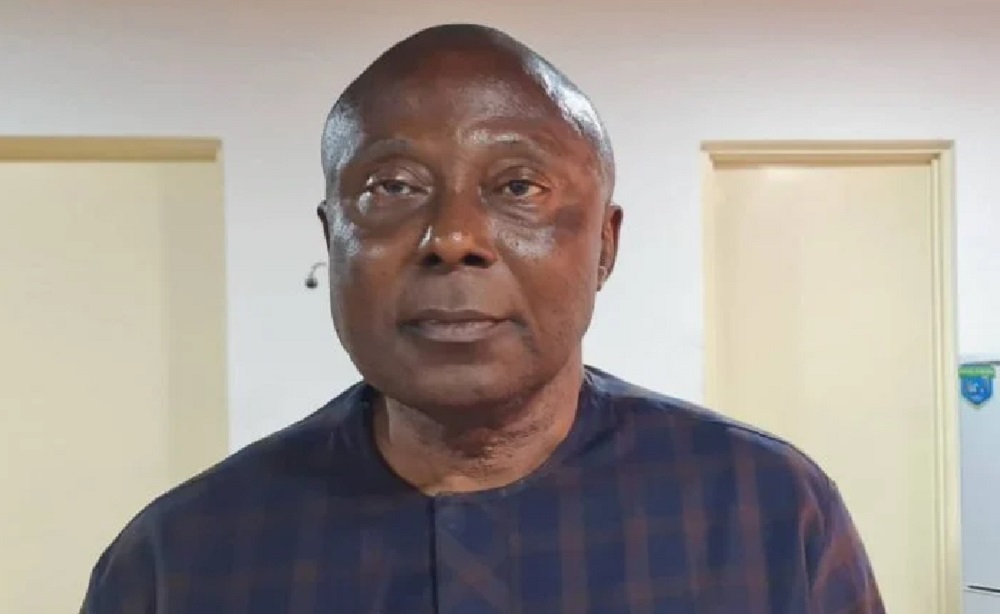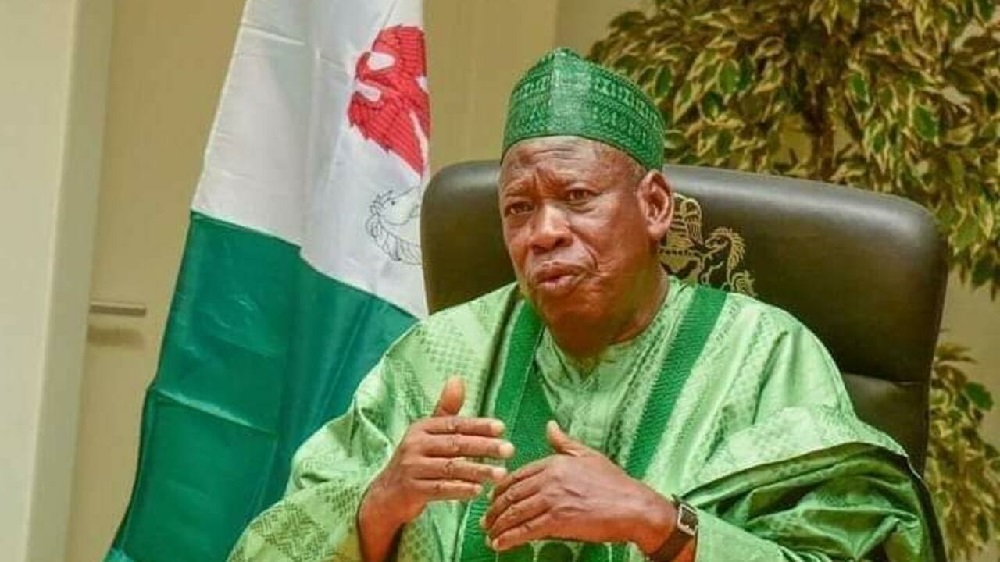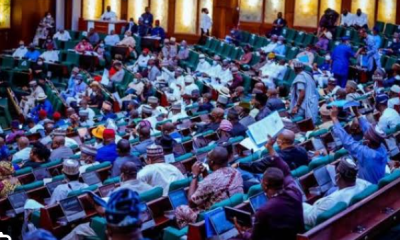News
Alleged N1.96b fraud: Court admits ex-acting AGF to N500m bail

A Federal High Court in Abuja yesterday admitted former acting Accountant-General of the Federation (AGF), Anamekwe Nnabuoku, to a N500 million bail with two sureties in the like sum over alleged N1.96 billion fraud.
Ruling on Nnabuoku’s bail application moved by his lawyer, Isidore Udenko, Justice James Omotosho ordered that the sureties must be owners of landed property within Abuja and should depose to an affidavit of means.
Justice Omotosho held that that the value of the property should not be less than N250 million each.
The judge ordered the sureties to submit their bank statements and tax clearance for three years, which should be verified by the court registrar.
He adjourned the matter till January 31 for trial.
Nwabuoku had pleaded not guilty to a nine-count amended charge preferred against him by the Economic and Financial Crimes Commission (EFCC) after the commission’s lawyer, Martha Babatunde, sought the leave of court for the charge to be read to him.
The News Agency of Nigeria (NAN) reports that the EFCC had listed Nnabuoku as the sole defendant in the charge.
In Count One of the charge filed on November 27, 2024 by Ekele Iheanacho (SAN), the EFCC alleged that Nnabuoku, alongside Temeeo Synergy Concept Limited (said to be on the run), Turge Global Investment Limited (also at large), Laptev Bridge Limited, Arafura Transnational Afro Limited (also at large) and other persons (all at large) conspired to convert funds which are proceeds of unlawful activities.
The anti-graft agency said the offence was contrary to Section 18 of the Money Laundering Prohibition Act, 2011 (as amended by Act Number 1 of 2012) and punishable under Section 15(3) of the same Act.
NAN reports that Nnabuoku and his co-defendant, Felix Nweke, in the earlier charge, had, on October 14, 2024, opted for a plea bargain agreement with the EFCC.
A lawyer who appeared for EFCC, Ogechi Ujam, informed Justice Omotosho upon resumed hearing in the matter.
Ujam had told the court that on the last adjourned date, Nnabuoku and Nweke had submitted proposal for settlement.
She said the parties, in the 11-count charge, had agreed and that the agreement was submitted to EFCC Chairman Ola Olukoyede for approval.
But when the matter was called yesterday, Babatunde, who represented the anti-graft agency, informed the court that an amended charge had been filed by the agency.
In the charge, only Nnabuoku was listed as defendant while Nweke’s name had been dropped.
Although upon resumed hearing, Nnabuoku and Nweke stepped into the dock, no lawyer appeared for the latter.
Justice Omotosho asked about his lawyer and Nweke said he called his lawyer on phone and he was expecting him to be in court.
The anti-graft lawyer told the court that the commission had filed an amended charge.
She prayed the court to allow the charge to be read to Nnabuoku, and it was not opposed by Udenko, who was counsel to him.
Nweke stepped out of the court and the nine counts were read to Nnabuoku, who pleaded not guilty to the charge.
His lawyer moved his bail application, which Babatunde opposed.
News
AMMC Partners NUJ-FCT On Infrastructural Development

News
UBEC plans new template for basic school fund disbursement

The Universal Basic Education Commission on Tuesday announced plans to introduce a new template for disbursing counterpart funds under the Universal Basic Education programme.
This was disclosed by the Executive Secretary of the commission, Aisha Garba, during an interactive workshop with State Universal Basic Education Boards in Abuja.
Garba explained that the Federal Government, through UBEC, had recently restructured the delivery of basic education nationwide to align with four strategic pillars aimed at improving access and quality across states and the Federal Capital Territory.
She identified the pillars as expanding access to basic education, especially for rural and underserved populations; enhancing the quality of teaching and learning nationwide; strengthening accountability and the effective use of education financing; and optimising monitoring and institutional systems for quality service delivery.
She said, “The Hope Education Project of the present administration is a performance-for-reward initiative designed to support states that judiciously utilise resources in line with these four pillars.”
She added that the new approach had made it necessary to develop fresh templates that will guide SUBEBs in preparing work plans to access UBE intervention funds under the framework of the Hope Education Project.
Also speaking at the event, UBEC’s Deputy Executive Secretary for General Services, Tunde Ajibulu, described the workshop as timely and essential.
He stressed that the realignment of basic education delivery made the introduction of the new templates crucial.
“We expect you, as implementers of basic education in your respective states, to contribute positively and help develop workable templates,” Ajibulu said.
News
Ganduje loses bid to quash $413,000, N1.8bn bribery charges

A Kano State High Court on Tuesday dismissed an application filed by former Kano State Governor and current National Chairman of the All Progressives Congress, Dr. Abdullahi Ganduje, challenging the court’s jurisdiction to hear a bribery and misappropriation case against him.
The Kano State Government brought 11 counts against Ganduje, his wife Hafsat, son Umar, and five others, alleging bribery totalling $413,000 and misappropriation of N1.38 billion.
The other defendants include Abubakar Bawuro, Umar Abdullahi Umar, Jibrilla Muhammad, Lamash Properties Limited, Safari Textiles Limited, and Lasage General Enterprises Limited.
Delivering her ruling, Justice Amina Adamu-Aliyu dismissed all preliminary objections raised by the defendants, describing them as incompetent and lacking merit.
She ruled that the charges filed on May 13, 2024, were competent and that the matter should proceed to trial.
The judge further issued a summons to the sixth defendant, Lamash Properties Limited, and adjourned the case to July 30 and 31, 2025, for hearing.
Ganduje, his wife Hafsat, and son Umar, had through their lawyer, Mrs. Lydia Oyewo, filed a preliminary objection dated November 18, 2024, challenging the court’s jurisdiction and seeking to have all charges quashed.
In response, counsel for the state government, Adeola Adedipe (SAN), filed a counter-application dated October 22, 2024, urging the court to dismiss the preliminary objections for lacking merit.
Similarly, counsel for the third and seventh defendants, M.N. Duru, (SAN), submitted a motion on notice dated October 18, 2024, supported by a 14-paragraph affidavit and a written address, asking the court to uphold their application.
Counsel for the fifth defendant, Muhammad Shehu, also filed a motion dated October 18, 2024, and urged the court to grant it with substantial costs against the complainant.
Abubakar Ahmad, representing the sixth defendant, filed a preliminary objection dated September 9, 2024, supported by a nine-paragraph affidavit.
Additionally, counsel for the eighth defendant, Faruk Asekome, filed a notice of preliminary objection dated October 18, 2024, supported by a five-paragraph affidavit and written address, also seeking dismissal of the charges.
Justice Adamu-Aliyu, however, ruled that the objections lacked merit and cleared the way for the trial to proceed.
-

 News17 hours ago
News17 hours agoJust in: Another major headache as 3 PDP senators defect to APC
-

 News18 hours ago
News18 hours agoCourt Jails Two Six Months for Naira Abuse in Lagos
-

 News19 hours ago
News19 hours agoUnion seals Lagos company over racial discrimination of workers
-

 News18 hours ago
News18 hours ago$1.43m scam: Ajudua on the run as Supreme Court orders his return to prison
-

 News19 hours ago
News19 hours agoCBN warns public against fraudsters claiming to act on its behalf
-

 News16 hours ago
News16 hours ago10 WAEC students still missing as Rivers women demand Sole Administrator’s intervention
-

 News16 hours ago
News16 hours agoReps reject bill on rotational presidency among six geopolitical zones
-

 News16 hours ago
News16 hours agoIf sight led me, I wouldn’t have married my wife, says Pastor Enenche

















